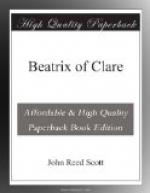But Darby did not answer; and for a while Richard watched him curiously, as with half-bared dagger and lips drawn back in rage, he glowered upon De Lacy, forgetful of all things save his hate. And so imminent seemed the danger, that Aymer put hand to his own poniard and fell into the posture to receive attack. And doubtless there, before the Throne itself, would these two men have fought to the death for very lust of the other’s blood, had not the clear, stern voice of the King aroused them, like cold water in a sleeping face.
“Do you not hear, Lord Darby? We await your plea!”
“Not guilty,” Darby answered in tones husky with rage. “And I demand wager of battle, as against the foul charge of this foreign slanderer and liar.”
“I pray you, my Liege, to grant it to the traitor,” said De Lacy eagerly.
But Richard waved him back. “The wager is refused. By the evidence shall the judgment be. Proceed, Sir Aymer de Lacy, we will hear you first.”
The Knight drew a packet from his doublet.
“I offer herewith,” he said, “the dying statement of Henry Stafford, late Duke of Buckingham, touching the part taken in his rebellion by the accused.”
“I object to it!” Darby cried.
“For what reason?”
“Because its execution has not been proven; and because, even if genuine, it is incompetent as being by a condemned traitor.”
“Let me see the paper,” said the King. . . “It is regular, on its face—signed by Stafford under his own seal and attested by Sir Richard Ratcliffe and Sir John Kendale. Do you wish their testimony?”
Lord Darby bowed.
“Sir Richard Ratcliffe and Sir John Kendale,” the King said, as they stood forth, “do you each testify on honor that these are your respective signatures, and that you saw Henry Stafford sign and affix his seal hereto?”
“We do, upon our knightly honor,” they replied.
“It would appear, Sir John, that the body of this document is in your handwriting.”
“It is, Your Majesty. I wrote it at request of Stafford and at his dictation.”
“Where?”
“In his room in the Blue Boar Inn in the town of Salisbury.”
“When?”
“On the afternoon of the second day of November last. When the Duke had signed it he went direct to execution.”
“And this document?” the King questioned.
“Was kept by me until presented to Your Majesty that same evening; and by your direction deposited among your private papers, whence I took it a few minutes since to give to Sir Aymer de Lacy.”
Another murmur of astonishment went up from the Court, but died quickly under Richard’s glance.
“Methinks, my lord,” he said addressing Darby, “the paper has been sufficiently proven and is competent as a dying declaration of a co-conspirator. Therefore, we admit it. . . Read it, my Lord Chancellor.”




